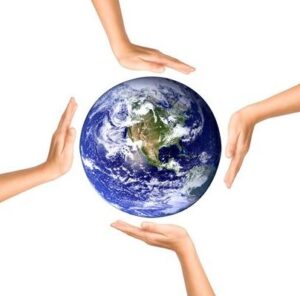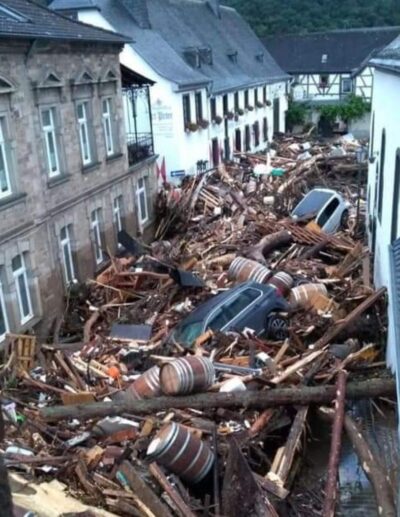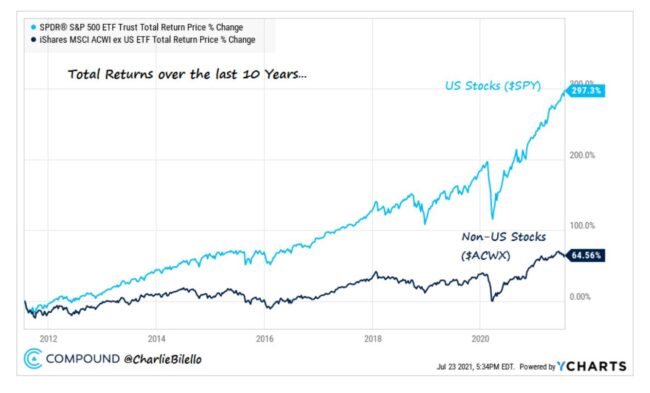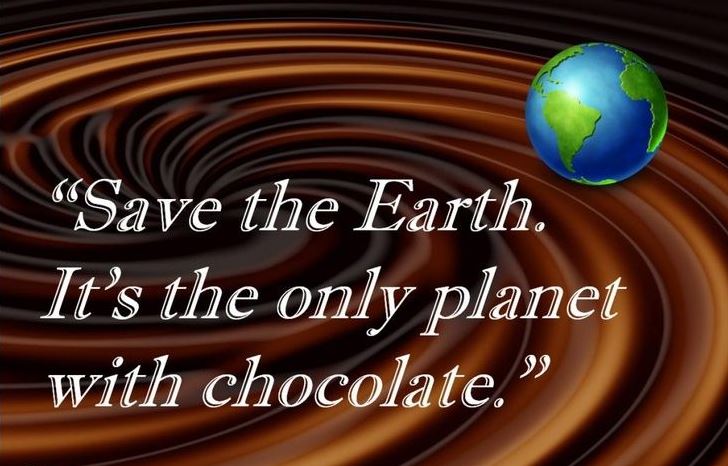
This month we’re going to divert from our typical investing information format and I hope that readers will forgive both the transgression and the preaching. It’s an easy read. And I promise that this will be the last negative posting for awhile, although this one, like the others, offers a solution.
Natural resources are finite and many are non-renewable and subject to permanent depletion in a world where the human population continues to both expand and to permanently destroy fragile ecosystems. It doesn’t matter what one’s personal beliefs are, we all want to live on a beautiful, clean and abundant planet. We all want to leave the world better for our children and grandchildren. And of course none of us actually wants to waste money, so the action steps shown below are a win/win proposition. Many individual small steps by many different individuals would make a big impact on our planet’s health.
An unhealthy planet is costly. Global warming causes the climate to change. Historically, global warming comes from any one of five possible causes and only one of them is viable today. Gigantic meteor strike? No. Huge volcanic eruption? No. Earth wobble causing a pole shift? No. Large, steady increase in solar energy? No because according to both NASA and NOAH that have tracked this in real time for many decades, there has been no meaningful change in solar energy or solar activity since the start of the Industrial Revolution. This leaves increased carbon in the air caused by humans burning a truly massive amount of carbon, especially during the past 50 years, and scientifically we know this to be true and it even passes the ‘common-sense test.’ But regardless of what you personally believe is the cause, we know that every degree Celsius of warming costs, on average, 1.2% in global GDP growth (Gross Domestic Product). This is an enormous number.
This morning as I sit here and type, I look out my window and the mountain range that begins its rise just one mile down the road is totally obscured by smoke. 2-million acres are currently burning up in the western half of the United States and the smoke is so thick here on the east coast, 2000 miles away, that if I open my home’s windows, the smoke detectors start screaming. I’m not kidding. Record heat and record drought. Just the other day the hottest temperature ever recorded on Earth occurred on the California/Nevada border, reaching 135 degrees Fahrenheit. It seemed like a wake up call, but it went un-noticed. And now we hear that elevated parts of Europe that had zero chance of ever being flooded are currently under water… beautiful and historic cities destroyed in just two days of torrential rain.

In about 20 years, if left unaddressed, there will be a confluence of environmental and economic problems that will reshape how all humans live and what type of (barren?) world our children will be forced to live in. The current rush into outer space is being caused by people that realize that this planet is in trouble… as if humans could ever be happy or healthy living on Mars. Common sense tells us that humans are perfectly designed to live only on this perfectly designed Earth. But it is still not too late to alter our course.
If you make even one small positive change, you are then part of the solution. So, what simple & easy things can one person do?
- Turning off the water while brushing one’s teeth can save 1,800 gallons of water per person, per year.
- A low-flow shower head will use 10 gallons of water during a 5 minute shower; a regular flow shower head wastes a full 25 gallons in 5 minutes. It requires 50 gallons of water to fill a tub for a bath.
- Turning down one’s thermostat by 1° will cut heating bills (and energy use) by 3%.
- There are 5 trillion non-biodegradable cigarette butts thrown out of car windows each year.
- Institute a mug (and a metal utensil) policy in one’s office. Americans throw away 25 billion non-biodegradable polystyrene cups per year.
- Use permanently reusable metal coffee filters at work.
- If all U.S. households would pay their bills online it would save 19 million trees and over 2 billion tons of carbon dioxide and almost 2 billion pounds of trash.
- Most electrical appliances (and chargers) move to standby mode when turned off, requiring them to continue to use 40% of their full running power. Plug them into power strips and turn the strip off when they are not in use. If all Americans did this, it would save the amount of power annually that is generated by 26 power plants.
- There are 180,000 tons of small batteries thrown away each year in the U.S. alone. Rechargeable batteries are the obvious choice.
- Attach a rain barrel to gutter downspouts. An average home’s rooftop, even in a relatively dry state, could collect a total of 17,000 gallons of water each year… 65% of the annual needs for that home.
- A trigger nozzle on a garden hose will save as much as 6 gallons of water per minute.
- Recycling all newspapers in the US alone would save 130 million trees per year.
- Use natural pesticides in order to save the birds and the bees.
- One bat will eat 1,000 mosquitoes per night, so put up a ‘bat box.’
- Get a bicycle… walk… burn a calorie.
- Drive cars until they die; next time purchase a fuel efficient hybrid car.
- Re-gift gift wrap.
- An inefficient lawnmower uses almost as much fuel as a car… go electric or use a push-rotary whenever possible (on small lawns).
- Switch to low energy LED light bulbs.
- Avoid plastic bags… take reusable cloth bags to the grocery store.
- Scraping rather than pre-washing dishes before putting them in your dishwasher would save each household 7,300 gallons of water per year plus the energy that it takes to heat the water.
- Inserting a “low flow” device in our toilets ($20 and 10 minutes time) would save 50 billion gallons of water per day across the globe.
- Attaching an after market bidet to your toilet ($50) will eliminate 90% of toilet paper use (did you catch the pun there?)
- Pre-heating ovens (except when baking pastries) is a complete waste of energy.
- Recycling all glass containers would stop Americans from burying 13 million TONS of glass waste per year. Glass takes one million years to decompose.
- When an appliance breaks, replace it with an Energy Star appliance. If everyone in America slowly replaced all of their appliances, it would save literally trillions of dollars of wasted fuel each year.
- When making decisions, always remember that oil is ultimately a finite commodity and we have a high likelihood of running (permanently) low beginning around the year 2035.
- Get a clothesline.
- Use green and recycled materials when building or remodeling.
- Go vegan to instantly cut your carbon footprint in half! I understand that this particular bullet point will really upset some readers, but I’m plowing ahead anyway (and I wish that WordPress would allow me to insert a smiley face here!). After working with patients for over 25 years, I came to understand that some people feel that a triple bypass heart surgery is less extreme than is going on a plant based diet. I do get it. And I’ve also heard so many people say: “I’m just one person and what can one person do that will make a difference?” This is the answer and I’ve personally been vegetarian and then vegan for the past 50 years of my life (I don’t normally push it… most people don’t even know). Veganism is the fastest growing global lifestyle movement in history with the number of adherents doubling every single year; this is massive exponential growth. 51% of climate change is directly related to meat, fish and fowl consumption. The Earth’s 8-billion people kill 3-billion animals per day, every day and that adds up to over 1-trillion animals killed per year. To produce just one pound of meat requires 2,500 gallons of clean water. 91% of the Amazon rainforest destruction has been done to raise animals for slaughter or to grow grain for them to temporarily live on. 30% of all of the Earth’s land-mass is now devoted to raising the animals that we kill & eat and this leads to massive soil erosion and desertification as well as polluted water systems from manure & waste runoff. The world’s aquifers are running on empty. Cattle produce 20% of the methane that is released into the atmosphere. Methane is 23X worse than carbon dioxide as a greenhouse gas. Modern fishing utilizes truly gigantic fishing nets that scrape the ocean floor and extend up to the surface, destroying and killing literally everything in their path; 95% of the big fish (as in sailfish and swordfish) are already gone. Most oxygen is produced in the oceans and if this complex cycle is disrupted, then nobody is going to be able to breath. I do know first hand that people can, fairly easily, go plant based and live to tell about it. The only side-effect is improved health and longevity for both ourselves and for our planet. And of course organic, local vegetables and fruits are both affordable and tasty.
- Plastic degrades into microscopic particles when dumped into our oceans (which is where most global trash goes) and some believe that this will kill all ocean life within 30 years. Fish cannot breathe in plastic contaminated water. Recycle. Help to encourage third-world countries to stop dumping their trash into the oceans. MarketCycle’s large 2020 charitable donation went to The Ocean Conservancy specifically for this reason (and we helped to sponsored the building of children’s playgrounds in inner cities in 2019).
- Compost all kitchen (and lawn) scraps that are not of animal origin. It benefits one’s garden while connecting us to the repeating cycles of life. Small yard waste, such as autumn leaves, can be shredded in an electric garden shredder before composting. If kitchen and yard scraps end up in garbage landfills, they produce tremendous amounts of methane gas.
- Buy organic local produce in season to reduce oil consumption by 40%.
- Fix leaky plumbing. A slow faucet drip can waste 20 gallons of water per day.
- We should check the insulation in our homes. There are companies that will check this for free. Heating and cooling makes up 70% of the energy use in most houses.
- Grow some organic food, even if it is one plant in one pot. It’s fun!
- Buy recycled products. Buy local when possible.
- Skip the coffee stirrer to save 138 billion plastic straws per year.
- Take a train instead of a plane.
- Recycle your own printing paper by using both sides of the paper.
- Diapers add 3.5 million tons of waste to landfills each year… use cloth or environmentally friendly disposable diapers instead.
- Re-use a cloth napkin instead of paper. Landfills receive one billion pounds of paper napkins per year.
- Using “cruise control” gives 15% better automobile mileage.
- Batch errands. Take a friend.
- Turn off lights. If no one is in the room, the light isn’t helping anyone.
- Keep one’s fireplace damper closed in winter or warm house air will be rapidly sucked out through the chimney.
- Donate rather than throw away.
- Financially support organizations that are part of the solution.
Brief MARKET SUMMARY: On Saturday July 17, 2021, I sent a Market Update to clients stating that the stock market was about to go down “very soon” and that the final loss would be around 5% and that it would then recover rapidly. On Monday July 19, 2021, just two days later, the Dow fell (intraday) 946 points and this represented a 4.5% loss off of the market top. It then recovered over the next three days. This drop almost instantly corrected enough of the weakness so that the stock market could proceed higher. S&P-500 @ 4600 sooner rather than later. As I’ve been repeating since early 2009, we are in the Secular stock bull market of our lifetimes. The S&P-500 is going to go beyond 10,000 and it won’t end for another 8-ish years, so gird up your loins and invest full throttle (but avoiding downturns is the key to making real profits).
MarketCycle’s accounts, including our many overseas accounts, have been correctly positioned in U.S. stocks and assets since early April of 2009 (after having been ‘short,’ and extremely profitable, all during the 2008 Financial Crash):

MarketCycle is here to help you; contact me with any questions that you might have even if you do not become a client, I’m here to serve. I personally reply to all legitimate email comments or questions.
There is a ‘Contact’ tab on the website’s top banner right next to the ‘Client Account Login’ tab. PDF and print functions are at the bottom of this page.
Thank you for reading this!
SUBSCRIBE to this free (no spam) MarketCycle Wealth Management BLOG.
MarketCycle Wealth Management is still accepting new clients. Our primary focus is in managing investment accounts and our analysis is uncannily accurate.
The CLIENT ACCOUNT LOGIN can now be found in the top tab section (far right) of our new website. If clients use this function, it leads them to the correct area of their account.



